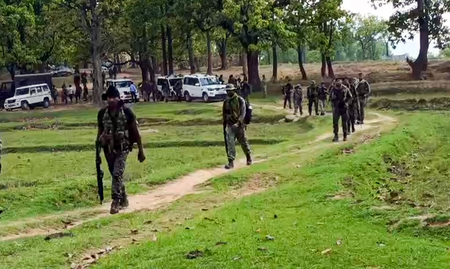New Delhi — Intelligence assessments indicate that the decades-long Maoist insurgency in India may come to an end well before the March 2026 deadline set by Union Home Minister Amit Shah. Security officials involved in anti-Maoist operations believe the movement has reached an irreversible point of decline.
A major signal of the insurgency’s weakening came from a letter written by Mallojula Venugopal Rao, alias Sonu, a 70-year-old senior Maoist leader, who publicly appealed for an end to the armed struggle to save the CPI (Maoist) organization.
Although it remains unclear whether Rao’s statement has the backing of other senior cadres, intelligence sources say the message reflects the disintegration of the movement that began in 1967. From his underground hideout, Rao reportedly apologized to members of the movement, admitting that the time had come to “change according to the circumstances.”
Despite this apparent call for peace, the Narendra Modi government has reiterated its zero-tolerance policy toward extremism. Home Minister Amit Shah has maintained that the Maoists have only two options — to surrender or face elimination.
A senior official involved in anti-Maoist strategy said that while Rao’s letter initially sparked internal discussions, the government swiftly decided against engaging in dialogue. “Such overtures have been used before as a tactic to regroup when they are under pressure. This time, the security forces are not falling for it,” the official said.
In the past, Maoist leaders would seek talks during setbacks, using negotiations as a cover to rebuild their strength. However, analysts note that this time, the insurgents misread the political and security environment.
“When the Modi government came to power in 2014, the Maoists underestimated its staying power. Only after the government’s re-election in 2019 did they realize the seriousness of its counterinsurgency strategy,” an analyst said.
Over the past decade, the government has combined strong security operations with intensive development initiatives, particularly in Maoist-affected areas. This dual approach has eroded local support for the rebels — once their most valuable asset. “The villagers who used to act as their eyes and ears have turned away from them,” said another security official.
The once-dominant Maoist stronghold of Bastar in Chhattisgarh is now believed to be on the verge of collapse. “We believe Rao is hiding there, and his letter is a clear indication that the movement is in its final phase,” the official noted.
Officials emphasize that unlike previous governments, which often pursued a “give-and-take” approach, the current administration has refused to compromise. From the outset, the Modi government adopted a zero-tolerance stance on all forms of terrorism, including the Maoist insurgency — a threat security experts once described as more severe than cross-border terrorism.
According to an Intelligence Bureau source, the Maoist cadre is now exhausted and demoralized. “They are holding on only for the sake of pride. Rao’s letter is a last-ditch attempt to stay relevant. But it’s clear they have run out of steam,” the officer said.
Home Minister Shah has made his position unequivocal — the movement must end, either through surrender or complete eradication. With security forces maintaining relentless pressure and intelligence agencies reporting near-collapse in Maoist structures, officials are confident that the end of the insurgency could come well before 2026.
With inputs from IANS

